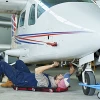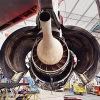82 careers found.
Aerospace engineers perform and supervise the design, development, manufacture and maintenance work of all types of flight vehicles. This may include military and civilian aeroplanes, helicopters, missiles, launch vehicles, spacecraft, satellites, and control and guidance systems.
Agricultural engineers study and advise on the use of engineering science and technology in agricultural production and management of natural resources. They solve problems relating to such things as sustainable agricultural production, the environmental impacts of intensive agriculture and the post-harvest handling of agricultural products.
Agricultural technical officers provide complex technical support and advise on aspects of agriculture such as research, production, servicing and marketing.
Air Force technicians and tradespersons undertake a variety of technical and trades-related jobs in the Air Force, including assisting with the construction and maintenance of Air Force equipment and buildings.
Aircraft maintenance engineers install, maintain and repair aircraft engines; airframes; airframe systems; electrical, instrument and radio systems; and aircraft structures and surface finishes.
Audiovisual technicians operate the equipment used in the development and delivery of audiovisual presentations.
Bicycle technicians repair, service and assemble bicycles.
Biomedical engineers apply engineering and scientific methods to find solutions to problems in medicine and the life sciences.
Broadcasting technicians install, start up, maintain and repair equipment used for the transmission and reception of television and radio broadcast signals. This includes transmitters, microphones, mixing desks, tape recorders, CD players, computers, television cameras and telecine equipment. They may also work on microwave and satellite equipment used for the transmission and reception of voice, data and images.
Business equipment technicians install, commission, maintain, repair and service computers, document centres, fax machines, photocopiers, cash registers and other electronic commercial and office machines. They may also undertake networking of devices.
Cartographic technicians assist cartographers with the analysis of field survey and land management data, aerial photographs and other geographic information sources to prepare maps, plans, charts and diagrams.
Chemical engineers design and coordinate the construction and operation of manufacturing facilities and processes that convert raw materials into everyday products such as petrol, toothpaste, pharmaceuticals and plastics.
Civil and structural engineering associates provide technical support to civil engineers and civil engineering technologists. They assist with the research, design, construction, operation and maintenance of projects such as roads, airports, railways, buildings, bridges, dams and drainage systems.
Civil engineers plan, design, construct, operate and maintain roads, bridges, dams, water supply schemes, sewerage systems, transportation systems, harbours, canals, dockyards, airports, railways, factories and large buildings.
Civil engineering technicians conduct tests of construction materials and prepare sketches and tables for civil engineers and civil engineering technologists. They assist with the research, design, construction, operation and maintenance of projects such as roads, airports, railways, buildings, bridges, dams and drainage systems.










